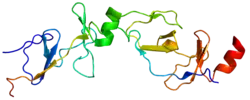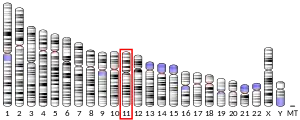LMO2
LIM domain only 2 (rhombotin-like 1), also known as LMO2, RBTNL1, RBTN2, RHOM2, LIM Domain Only Protein 2, TTG2, and T-Cell Translocation Protein 2, is a protein which in humans is encoded by the LMO2 gene.[5]
| LMO2 | |||||||||||||||||||||||||||||||||||||||||||||||||||
|---|---|---|---|---|---|---|---|---|---|---|---|---|---|---|---|---|---|---|---|---|---|---|---|---|---|---|---|---|---|---|---|---|---|---|---|---|---|---|---|---|---|---|---|---|---|---|---|---|---|---|---|
 | |||||||||||||||||||||||||||||||||||||||||||||||||||
| |||||||||||||||||||||||||||||||||||||||||||||||||||
| Identifiers | |||||||||||||||||||||||||||||||||||||||||||||||||||
| Aliases | LMO2, RBTN2, RBTNL1, RHOM2, TTG2, LIM domain only 2, LMO-2 | ||||||||||||||||||||||||||||||||||||||||||||||||||
| External IDs | OMIM: 180385 MGI: 102811 HomoloGene: 4072 GeneCards: LMO2 | ||||||||||||||||||||||||||||||||||||||||||||||||||
| |||||||||||||||||||||||||||||||||||||||||||||||||||
| |||||||||||||||||||||||||||||||||||||||||||||||||||
| |||||||||||||||||||||||||||||||||||||||||||||||||||
| |||||||||||||||||||||||||||||||||||||||||||||||||||
| Wikidata | |||||||||||||||||||||||||||||||||||||||||||||||||||
| |||||||||||||||||||||||||||||||||||||||||||||||||||
Function
LMO2 encodes a cysteine-rich, two LIM domain protein that is required for yolk sac erythropoiesis.[6] The LMO2 protein has a central and crucial role in hematopoietic development and is highly conserved.
Clinical significance
Aberrant LMO2 expression is a significant feature of T cell acute lymphoblastic leukaemia with multiple described mechanisms of activation.[7][8] The LMO2 transcription start site is located approximately 25 kb downstream from the 11p13 T-cell translocation cluster (11p13 ttc), where a number of T-cell acute lymphoblastic leukemia-specific translocations occur.[9] An upstream noncoding DNA element is also the site of recurrent mutations in T cell acute lymphoblastic leukaemia, leading the recruitment of the transcription factor MYB and significant H3K27ac enrichment and thus the formation of an aberrant enhancer which up-regulates the expression of LMO2 [10] Furthermore, recurrent and somatically acquired mutations of LMO2 intron 1 lead to its over-expression in both adult and paediatric T cell acute lymphoblastic leukaemia.[11] These mutations introduce new transcription factor binding sites for MYB, ETS1 and RUNX1 allowing for the formation of an aberrant promoter which drives LMO2 expression.
Interactions
LMO2 has been shown to interact with:
References
- GRCh38: Ensembl release 89: ENSG00000135363 - Ensembl, May 2017
- GRCm38: Ensembl release 89: ENSMUSG00000032698 - Ensembl, May 2017
- "Human PubMed Reference:". National Center for Biotechnology Information, U.S. National Library of Medicine.
- "Mouse PubMed Reference:". National Center for Biotechnology Information, U.S. National Library of Medicine.
- Boehm T, Foroni L, Kaneko Y, Perutz MF, Rabbitts TH (May 1991). "The rhombotin family of cysteine-rich LIM-domain oncogenes: distinct members are involved in T-cell translocations to human chromosomes 11p15 and 11p13". Proceedings of the National Academy of Sciences of the United States of America. 88 (10): 4367–4371. doi:10.1073/pnas.88.10.4367. PMC 51660. PMID 2034676.
- Warren AJ, Colledge WH, Carlton MB, Evans MJ, Smith AJ, Rabbitts TH (July 1994). "The oncogenic cysteine-rich LIM domain protein rbtn2 is essential for erythroid development". Cell. 78 (1): 45–57. doi:10.1016/0092-8674(94)90571-1. PMID 8033210. S2CID 7156927.
- Boehm T, Foroni L, Kaneko Y, Perutz MF, Rabbitts TH (May 1991). "The rhombotin family of cysteine-rich LIM-domain oncogenes: distinct members are involved in T-cell translocations to human chromosomes 11p15 and 11p13". Proceedings of the National Academy of Sciences of the United States of America. 88 (10): 4367–4371. doi:10.1073/pnas.88.10.4367. PMC 51660. PMID 2034676.
- Fisch P, Boehm T, Lavenir I, Larson T, Arno J, Forster A, Rabbitts TH (December 1992). "T-cell acute lymphoblastic lymphoma induced in transgenic mice by the RBTN1 and RBTN2 LIM-domain genes". Oncogene. 7 (12): 2389–2397. PMID 1461647.
- EntrezGene 4005
- Abraham BJ, Hnisz D, Weintraub AS, Kwiatkowski N, Li CH, Li Z, et al. (February 2017). "Small genomic insertions form enhancers that misregulate oncogenes". Nature Communications. 8: 14385. doi:10.1038/ncomms14385. PMC 5309821. PMID 28181482.
- Rahman S, Magnussen M, León TE, Farah N, Li Z, Abraham BJ, et al. (June 2017). "Activation of the LMO2 oncogene through a somatically acquired neomorphic promoter in T-cell acute lymphoblastic leukemia". Blood. 129 (24): 3221–3226. doi:10.1182/blood-2016-09-742148. PMC 5472898. PMID 28270453.
- Osada H, Grutz G, Axelson H, Forster A, Rabbitts TH (October 1995). "Association of erythroid transcription factors: complexes involving the LIM protein RBTN2 and the zinc-finger protein GATA1". Proceedings of the National Academy of Sciences of the United States of America. 92 (21): 9585–9589. doi:10.1073/pnas.92.21.9585. PMC 40846. PMID 7568177.
- Mao S, Neale GA, Goorha RM (April 1997). "T-cell oncogene rhombotin-2 interacts with retinoblastoma-binding protein 2". Oncogene. 14 (13): 1531–1539. doi:10.1038/sj.onc.1200988. PMID 9129143.
- Bégay-Müller V, Ansieau S, Leutz A (June 2002). "The LIM domain protein Lmo2 binds to AF6, a translocation partner of the MLL oncogene". FEBS Letters. 521 (1–3): 36–38. doi:10.1016/s0014-5793(02)02814-4. PMID 12067721. S2CID 29461336.
- Wadman I, Li J, Bash RO, Forster A, Osada H, Rabbitts TH, Baer R (October 1994). "Specific in vivo association between the bHLH and LIM proteins implicated in human T cell leukemia". The EMBO Journal. 13 (20): 4831–4839. doi:10.1002/j.1460-2075.1994.tb06809.x. PMC 395422. PMID 7957052.
- Valge-Archer VE, Osada H, Warren AJ, Forster A, Li J, Baer R, Rabbitts TH (August 1994). "The LIM protein RBTN2 and the basic helix-loop-helix protein TAL1 are present in a complex in erythroid cells". Proceedings of the National Academy of Sciences of the United States of America. 91 (18): 8617–8621. doi:10.1073/pnas.91.18.8617. PMC 44657. PMID 8078932.
- Goardon N, Lambert JA, Rodriguez P, Nissaire P, Herblot S, Thibault P, et al. (January 2006). "ETO2 coordinates cellular proliferation and differentiation during erythropoiesis". The EMBO Journal. 25 (2): 357–366. doi:10.1038/sj.emboj.7600934. PMC 1383517. PMID 16407974.
Further reading
- Royer-Pokora B, Loos U, Ludwig WD (October 1991). "TTG-2, a new gene encoding a cysteine-rich protein with the LIM motif, is overexpressed in acute T-cell leukaemia with the t(11;14)(p13;q11)". Oncogene. 6 (10): 1887–1893. PMID 1923511.
- Boehm T, Foroni L, Kaneko Y, Perutz MF, Rabbitts TH (May 1991). "The rhombotin family of cysteine-rich LIM-domain oncogenes: distinct members are involved in T-cell translocations to human chromosomes 11p15 and 11p13". Proceedings of the National Academy of Sciences of the United States of America. 88 (10): 4367–4371. doi:10.1073/pnas.88.10.4367. PMC 51660. PMID 2034676.
- Boehm T, Spillantini MG, Sofroniew MV, Surani MA, Rabbitts TH (May 1991). "Developmentally regulated and tissue specific expression of mRNAs encoding the two alternative forms of the LIM domain oncogene rhombotin: evidence for thymus expression". Oncogene. 6 (5): 695–703. PMID 2052354.
- Dong WF, Xu Y, Hu QL, Munroe D, Minowada J, Housman DE, Minden MD (November 1995). "Molecular characterization of a chromosome translocation breakpoint t(11;14)(p13;q11) from the cell line KOPT-K1". Leukemia. 9 (11): 1812–1817. PMID 7475267.
- Osada H, Grutz G, Axelson H, Forster A, Rabbitts TH (October 1995). "Association of erythroid transcription factors: complexes involving the LIM protein RBTN2 and the zinc-finger protein GATA1". Proceedings of the National Academy of Sciences of the United States of America. 92 (21): 9585–9589. doi:10.1073/pnas.92.21.9585. PMC 40846. PMID 7568177.
- Sánchez-García I, Axelson H, Rabbitts TH (April 1995). "Functional diversity of LIM proteins: amino-terminal activation domains in the oncogenic proteins RBTN1 and RBTN2". Oncogene. 10 (7): 1301–1306. PMID 7731680.
- Wadman I, Li J, Bash RO, Forster A, Osada H, Rabbitts TH, Baer R (October 1994). "Specific in vivo association between the bHLH and LIM proteins implicated in human T cell leukemia". The EMBO Journal. 13 (20): 4831–4839. doi:10.1002/j.1460-2075.1994.tb06809.x. PMC 395422. PMID 7957052.
- Valge-Archer VE, Osada H, Warren AJ, Forster A, Li J, Baer R, Rabbitts TH (August 1994). "The LIM protein RBTN2 and the basic helix-loop-helix protein TAL1 are present in a complex in erythroid cells". Proceedings of the National Academy of Sciences of the United States of America. 91 (18): 8617–8621. doi:10.1073/pnas.91.18.8617. PMC 44657. PMID 8078932.
- Wilkinson DA, Neale GA, Mao S, Naeve CW, Goorha RM (January 1997). "Elf-2, a rhombotin-2 binding ets transcription factor: discovery and potential role in T cell leukemia". Leukemia. 11 (1): 86–96. doi:10.1038/sj.leu.2400516. PMID 9001422.
- Mao S, Neale GA, Goorha RM (April 1997). "T-cell oncogene rhombotin-2 interacts with retinoblastoma-binding protein 2". Oncogene. 14 (13): 1531–1539. doi:10.1038/sj.onc.1200988. PMID 9129143.
- Osada H, Grutz GG, Axelson H, Forster A, Rabbitts TH (April 1997). "LIM-only protein Lmo2 forms a protein complex with erythroid transcription factor GATA-1". Leukemia. 11 (Suppl 3): 307–312. PMID 9209374.
- Wadman IA, Osada H, Grütz GG, Agulnick AD, Westphal H, Forster A, Rabbitts TH (June 1997). "The LIM-only protein Lmo2 is a bridging molecule assembling an erythroid, DNA-binding complex which includes the TAL1, E47, GATA-1 and Ldb1/NLI proteins". The EMBO Journal. 16 (11): 3145–3157. doi:10.1093/emboj/16.11.3145. PMC 1169933. PMID 9214632.
- Visvader JE, Mao X, Fujiwara Y, Hahm K, Orkin SH (December 1997). "The LIM-domain binding protein Ldb1 and its partner LMO2 act as negative regulators of erythroid differentiation". Proceedings of the National Academy of Sciences of the United States of America. 94 (25): 13707–13712. doi:10.1073/pnas.94.25.13707. PMC 28370. PMID 9391090.
- Jurata LW, Pfaff SL, Gill GN (February 1998). "The nuclear LIM domain interactor NLI mediates homo- and heterodimerization of LIM domain transcription factors". The Journal of Biological Chemistry. 273 (6): 3152–3157. doi:10.1074/jbc.273.6.3152. PMID 9452425.
- Kenny DA, Jurata LW, Saga Y, Gill GN (September 1998). "Identification and characterization of LMO4, an LMO gene with a novel pattern of expression during embryogenesis". Proceedings of the National Academy of Sciences of the United States of America. 95 (19): 11257–11262. doi:10.1073/pnas.95.19.11257. PMC 21629. PMID 9736723.
- Ono Y, Fukuhara N, Yoshie O (December 1998). "TAL1 and LIM-only proteins synergistically induce retinaldehyde dehydrogenase 2 expression in T-cell acute lymphoblastic leukemia by acting as cofactors for GATA3". Molecular and Cellular Biology. 18 (12): 6939–6950. doi:10.1128/MCB.18.12.6939. PMC 109277. PMID 9819382.
- Bach I, Rodriguez-Esteban C, Carrière C, Bhushan A, Krones A, Rose DW, et al. (August 1999). "RLIM inhibits functional activity of LIM homeodomain transcription factors via recruitment of the histone deacetylase complex". Nature Genetics. 22 (4): 394–399. doi:10.1038/11970. PMID 10431247. S2CID 22326394.
- Vitelli L, Condorelli G, Lulli V, Hoang T, Luchetti L, Croce CM, Peschle C (July 2000). "A pentamer transcriptional complex including tal-1 and retinoblastoma protein downmodulates c-kit expression in normal erythroblasts". Molecular and Cellular Biology. 20 (14): 5330–5342. doi:10.1128/MCB.20.14.5330-5342.2000. PMC 85982. PMID 10866689.
- Davenport J, Neale GA, Goorha R (November 2000). "Identification of genes potentially involved in LMO2-induced leukemogenesis". Leukemia. 14 (11): 1986–1996. doi:10.1038/sj.leu.2401913. PMID 11069036.
- Sum EY, Peng B, Yu X, Chen J, Byrne J, Lindeman GJ, Visvader JE (March 2002). "The LIM domain protein LMO4 interacts with the cofactor CtIP and the tumor suppressor BRCA1 and inhibits BRCA1 activity". The Journal of Biological Chemistry. 277 (10): 7849–7856. doi:10.1074/jbc.M110603200. PMID 11751867.




